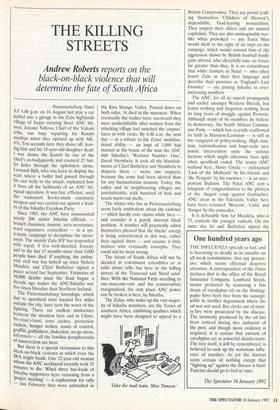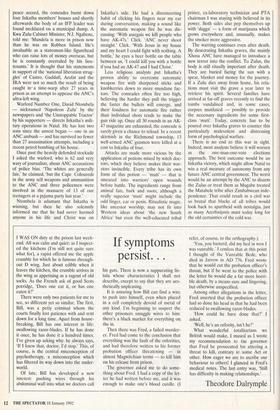THE KILLING STREETS
black-on-black violence that will determine the fate of South Africa
Pietermaritzburg, Natal AT 4.00 p.m. on 16 August last year a car pulled into a garage in the Zulu highlands village of Ixopo carrying three ANC hit- men. Jerome Ndlovu, Chief of the Vakani tribe, was busy repairing his Kombi minibus when they opened up with AK- 47s. Ten seconds later they drove off, leav- ing him and his 18-year-old daughter dead. I was shown the Kombi by one of the chiefs ex-bodyguards and counted 25 bul- let holes through the upholstery alone. Leonard Bjili, who was keen to display the scars where a bullet had passed through his vast belly in the attack, explained how it bore all the hallmarks of an ANC hit- squad operation. It was fast, efficient, used the trademark Soviet-made automatic weapon and was carried out against a lead- er of the Inkatha Freedom Party. Since 1985, the ANC have assassinated nearly 200 senior Inkatha officials branch chairmen, mayors, area secretaries, ward organisers, councillors — in a sys- tematic campaign to decapitate the move- ment. The mainly Zulu IFP has responded with equal, if less well-directed, ferocity and in the last 15 months more than 3,000 people have died. If anything, the embry- onic civil war has hotted up since Nelson Mandela and Chief Buthelezi signed a peace accord last September. Estimates of 10,000 deaths since the feud began a decade ago makes the ANC/Inkatha war five times bloodier than Northern Ireland.
The Pietermaritzburg townships, which due to apartheid were located five miles outside the city, have seen the worst of the fighting. There are endless similarities between the situation here and in Ulster. No-man's-land, arms caches, protection rackets, hunger strikes, zones of control, graffiti, godfathers, abduction, no-go areas, informers — all the familiar paraphernalia of insurrection are here.
But there is a special viciousness to this black-on-black violence at which even the IRA might baulk. One 22-year-old woman whom the ANC necklaced recently took 35 minutes to die. When three bus-loads of Inkatha supporters were returning from a `prayer meeting' — a euphemism for rally — last February they were ambushed in
the Kwa Shange Valley. Pinned down on both sides, 16 died in the massacre. When eventually the bodies were recovered they were unidentifiable after women from the attacking village had smashed the corpses' faces in with rocks. By 6.00 a.m. the next day — in a tribute to the Zulus' mobilisa- tional ability — an impi of 5,000 had massed at the house of the man the ANC dub Inkatha's 'Warlord Number One', David Ntombela. It took all the blandish- ments of Chief Buthelezi and Ntombela to disperse them — more, one suspects, because the army had been alerted than for any humanitarian reasons. Today, the valley and its neighbouring villages are uninhabitable, with hundred of huts and kraals burnt-out shells.
The whites who live in Pietermaritzburg seem fairly ambivalent about the violence — which hardly ever claims white lives and consider it a purely internal black problem. A number will practically admit themselves pleased that the blacks' energy is being concentrated in this way, rather than against them — and assume it little matters who eventually triumphs. They could not he more wrong.
The future of South Africa will not be decided in constituent assemblies or at talks about talks but here in the killing streets of the Transvaal and Natal satel- lites. With the National Party acceding to one-man-one-vote and the conservatives marginalised, the only place ANC power can be broken is here, by Inkatha.
The Zulus, who make up the vast major- ity of Inkatha members, are the Tories of southern Africa, exhibiting qualities which might have been designed to appeal to a 'Take the mail train, Miss Timson.'
British Conservative. They are proud (call- ing themselves 'Children of Heaven), dependable, God-fearing monarchists. They respect their elders and are natural capitalists. They are also unimaginably war- like when provoked — any Essex Man would thrill to the sight of an impi on the rampage, which would remind him of the aggression shown by British football hooli- gans abroad, who cheerfully take on forces far greater than they. It is no coincidence that white farmers in Natal — who often learnt Zulu as their first language and describe their province as 'England's Last Frontier' — are joining lnkatha in ever- increasing numbers.
The ANC, for all its superb propaganda and cachet amongst Western liberals, has learnt nothing and forgotten nothing from its long years of struggle against Pretoria. Although many of its members do believe in democracy, the South African Commu- nist Party — which has recently reaffirmed its faith in Marxism-Leninism — is still in the vanguard of policy-making. High taxa- tion, nationalisation and large-scale eco- nomic intervention unite the various factions which might otherwise have split when apartheid ended. The senior ANC warlord here, Harry Gwala — nicknamed `Lion of the Midlands' by his friends and 'the Penguin' by his enemies — is an unre- pentant Stalinist. The Natal ANC sent a telegram of congratulations to the plotters of the August coup against Gorbachev. ANC areas in the Edendale Valley here have been renamed 'Moscow', 'Cuba' and `Swapo' by the comrades.
It is debatable how far Mandela, who is 73, controls the younger radicals. On the same day he and Buthelezi signed the peace accord, the comrades burnt down four Inkatha members' houses and shortly afterwards the body of an IFP leader was found necklaced on a municipal dump. A Kwa Zulu Cabinet Minister, N.J. Ngabene, told me: 'Mandela is more in prison now than he was on Robben Island. He's invaluable as a statesman-like figurehead who can raise lots of money overseas, but he is constantly overruled by his lieu- tenants.' It is thought that his statements in support of the 'national liberation strug- gles' of Castro, Gaddafi, Arafat and the IRA were not so much the result of being caught in• a time-warp after 27 years in prison as an attempt to appease the ANC's ultra-left wing.
Warlord Number One, David Ntombela — nicknamed 'Napoleon Zulu' by the newspapers and 'the Unstoppable Tractor' by his supporters — directs Inkatha's mili- tary operations in Natal. He has lost two sons since the unrest began — one in an ANC ambush — and has survived no fewer than 27 assassination attempts, including a recent petrol bombing of his house.
Once past the heavily defended stockade I asked the warlord, who is 62 and very wary of journalists, about ANC accusations of police bias. The whites are generally fair,' he claimed, 'but the Cape Coloureds in the army sell weapons and ammunition to the ANC and three policemen were involved in the massacre of 13 of our teenagers at a pyjama party last year.'
Ntombela is adamant that Inkatha is winning, but then he also solemnly informed me that he had never harmed anyone in his life and Christ was on Inkatha's side. He had a disconcerting habit of clicking his fingers near my ear during conversation, making a sound like the automatic weapon fire he was dis- cussing: 'With assegais we kill people who have AK-47s.' Click. 'ANC never shoot straight.' Click. 'With Jesus in my house and my heart I could fight with nothing. A bottle,' he eyes a beer bottle on the table between us, 'I could kill you with a bottle if you had an AK-47 and I had Christ.'
Less religious analysts put Inkatha's proven ability to overcome automatic weapon fire with sharpened sticks and knobkerries down to more mundane fac- tors. The comrades often fire too high, believing the harder they pull the trigger the faster the bullets will emerge, and their fondness for automatic fire rather than individual shots tends to make the gun ride up. Once all 30 rounds in an AK- 47 magazine are exhausted, the comrade is rarely given a chance to reload. In a recent skirmish in the Richmond township, 13 well-armed ANC gunmen were killed at a cost to Inkatha of four.
Attacks are made more vicious by the application of potions mixed by witch doc- tors, which they believe makes their war- riors invincible. Every tribe has its own form of this potion — 'muti' — that is smeared into warriors' open wounds before battle. The ingredients range from animal fats, bark and roots, although a really superior 'muti' might include the odd finger, ear or penis. Ritualistic magic, like ancestor worship, may not fit into Western ideas about 'the new South Africa' but even the well-educated tribal prince, ex-laboratory technician and PTA chairman I was staying with believed in its power. Both sides also pep themselves up with `dagga' — a form of marijuana which grows everywhere and, unusually, makes the smoker more aggressive.
The warring continues even after death. By desecrating Inkatha graves, the mainly Xhosa ANC have managed to introduce a new terror into the conflict. To Zulus, the body is still ritually important after death. They are buried facing the sun with a spear, blanket and money for the journey. If a Zulu dies away from home, his rela- tions must visit the grave a year later to retrieve his spirit. Several families have arrived at far-off graves recently to find the tombs vandalised and, in some cases, corpses mutilated — possibly to provide the necessary ingredients for some first- class 'muti'. Today, concrete has to be poured over Inkatha graves to counter this particularly malevolent and distressing form of psychological warfare.
There is no end to this war in sight. Indeed, most analysts believe it will worsen as the one-man-one-vote elections approach. The best outcome would be an Inkatha victory, which might allow Natal to win a real measure of autonomy from any future ANC central government. The worst would be an attempt by the ANC to disarm the Zulus or treat them as Mugabe treated the Matabele tribe after Zimbabwean inde- pendence. That could result in a civil war so brutal that blacks of all tribes would look back to apartheid with nostalgia, just as many Azerbaijanis must today long for the old certainties of the cold war.



















































 Previous page
Previous page